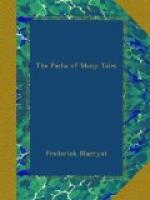“Now, Zara, do you forgive me? Now do you believe that I sincerely love you, and have I obtained my pardon?”
“Yes,” replied I, “I do, sultan; I forgive you all; and now——I will permit you to sit by me and bathe my feet.”
From that day I resumed my empire with more despotic power than ever. I insisted that I should refuse his visits when I felt so inclined; and when I imagined that there was the slightest degree of satiety on his part, he was certain to be refused admittance for a fortnight. I became the depositary of his secrets and the mover of his counsels. My sway was unlimited, and I never abused it. I loved him, and his honour and his welfare were the only guides to my conduct.
* * * * *
“But your highness will probably be tired, and as I have now told how it was that I suffered the bastinado, you will perhaps wait till to-morrow for the history of the bowstring.”
“I believe that the old woman is right,” said Mustapha, yawning; “it is late. Is it your highness’s pleasure that she shall return to-morrow evening?”
“Be it so; but let her be in close custody—you remember.”
“Be chesm—on my eyes be it. Guards, remove this woman from the sublime presence.”
“It appears to me,” said the pacha to Mustapha, “that this old woman’s story may be true. The description of the harem is so correct—commanding one day, bastinadoed the next.”
“Who can doubt the fact, your sublime highness? The Lord of Life dispenses as he thinks fit.”
“Very true; he might send me the bowstring to-morrow.”
“Allah forbid!”
“I pray with you; but life is uncertain, and it is our fate. You are my vizier to-day, for instance, what may you be to-morrow?”
“Whatever your highness may decide,” replied Mustapha, not much liking the turn of the conversation. “Am not I your slave, and as the dirt under your feet—and shall I not bow to your sovereign pleasure, and my destiny?”
“It is well said, and so must I, if the caliph sends me a Capitan Badji, which Allah forbid. There is but one God, and Mahomet is his Prophet.”
“Amen,” replied Mustapha. “Will your highness drink of the water of Giaour?”
“Yes, truly; for what says the poet? ’We are merry to-day and to-morrow we die.’”
“Min Allah; God forbid! That old woman has lived a long while, why shouldn’t we?”
“I don’t know; but she has had the bowstring and is not yet dead. We may not be so fortunate.”
“May we never have it at all; then shall we escape, O pacha.”
“True, Mustapha; so give me the bottle.”
Chapter XXI
The next evening the old woman made her appearance, without raising any difficulty, as on the previous day, and took her seat before the pacha, and thus continued:—




